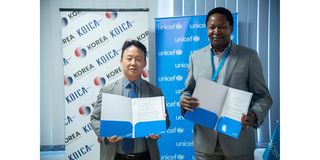KOICA, UNICEF launch $5.8m STEM education partnership to advance Tanzania’s Vision 2050

KOICA Country Director of Tanzania office, Manshik Shin (left) and UNICEF Deputy Representative (Operations), Lawrence Oundo,(right) displaying the signed STEM Education Partnership worth US$5.8 million that will expand learning opportunities for secondary school students by enhancing access to practical STEM education and digital tools. Through this initiative, UNICEF will construct and equip science and ICT laboratories in 13 secondary schools across Dodoma and Simiyu regions. PHOTO/ UNICEF Tanzania.
What you need to know:
- The programme seeks to expand access to quality STEM education in secondary schools, particularly in the Dodoma and Simiyu regions, where UNICEF will construct and equip science and ICT laboratories in 13 selected schools. It also includes teacher training components, with a deliberate focus on empowering female educators as mentors and role models in STEM fields.
Dar es Salaam. The Korea International Cooperation Agency (KOICA) and the United Nations Children’s Fund (UNICEF) have launched a $5.8 million partnership aimed at strengthening Science, Technology, Engineering and Mathematics (STEM) and digital skills education in Tanzania, marking a significant stride toward the realisation of the country’s Vision 2050 goals.
The initiative was formalised in Dar es Salaam on Tuesday, July 30, with KOICA Tanzania Country Director Manshik Shin and UNICEF Deputy Representative (Operations) Lawrence Oundo signing on behalf of their respective organisations.
The programme seeks to expand access to quality STEM education in secondary schools, particularly in the Dodoma and Simiyu regions, where UNICEF will construct and equip science and ICT laboratories in 13 selected schools. It also includes teacher training components, with a deliberate focus on empowering female educators as mentors and role models in STEM fields.
“We believe that investing in STEM and digital skills will play a key role in shaping Tanzania’s future as envisioned in Vision 2050,” said Mr Shin. “By expanding inclusive STEM education and empowering teachers, this partnership not only addresses current educational gaps but also contributes directly to building the innovation-driven and knowledge-based economy that Vision 2050 aspires to.”
Tanzania has faced persistent challenges in STEM education, with only 32 percent of public secondary schools currently equipped with fully functional science laboratories. The shortage of practical infrastructure and qualified teaching staff has been a major hurdle in delivering hands-on learning experiences, especially in underserved areas.
UNICEF’s Deputy Representative, Mr Oundo, highlighted the programme’s broader impact on national development. “This partnership marks a significant step in equipping Tanzania’s youth with the skills needed to thrive in an increasingly digital and technology-driven world,” he said.
“By investing in STEM, digital skills, and the necessary teacher training and infrastructure, we are supporting Tanzania to build the skilled human capital the country will need to drive inclusive and innovative growth towards Vision 2050.”
The two-year initiative will be implemented in close collaboration with the Ministry of Education and local government authorities, aligning with Tanzania’s National Education Sector Plan. The project includes continuous monitoring and evaluation to assess its impact on students’ academic performance and career opportunities in STEM-related fields.
Beyond infrastructure and training, the initiative aims to inspire more students—especially girls—to pursue STEM careers, addressing gender disparities and fostering inclusive growth in science and technology sectors.
The KOICA–UNICEF partnership reflects a broader commitment to helping Tanzania achieve its Vision 2050 aspiration of becoming an upper middle-income country through innovation, education, and sustainable development.





